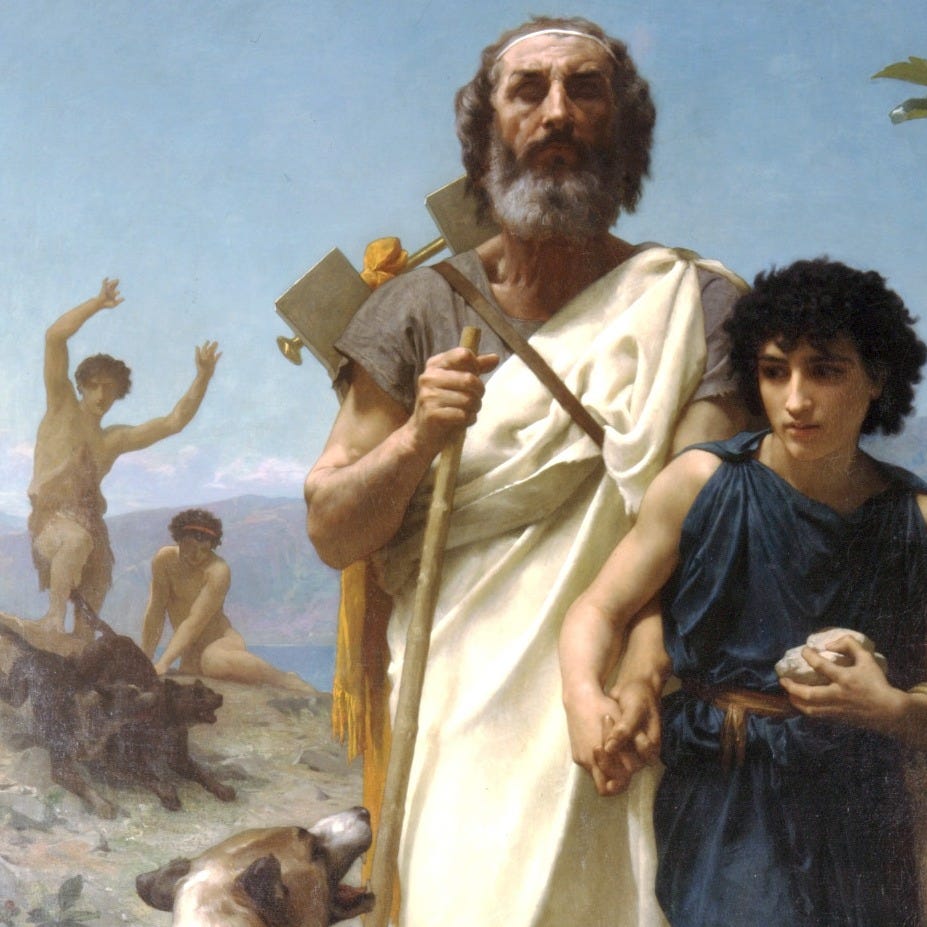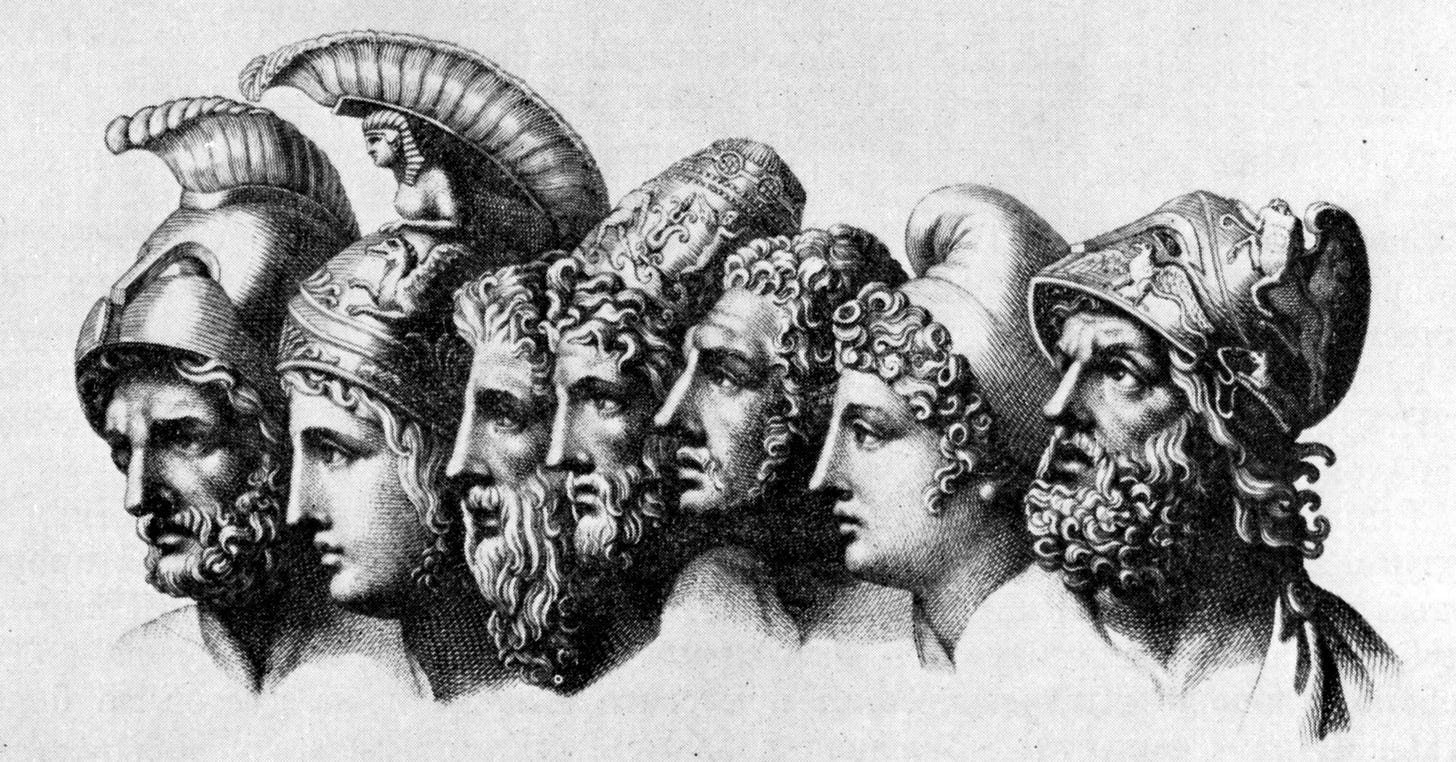Do Christians owe a debt to Homer?
The indelible Greek mark upon Christianity
Hellenized culture is not alien to the Bible but essential to it.
And Homer is essential to Hellenized culture. As such, Homer serves as a fountainhead to a Greek language and thought that flows into both Western culture and Christianity.
Yet, is Homer’s influence reducible to a historical accident? Well, Christians see in Homer a movement of Divine Providence—a movement that shapes the very heart of Christianity, Jesus Christ Himself.
In fact, when you read Homer, you do not simply understand Homer, but you understand more about yourself.
You are a stone in the river, and Homer is a larger part of the culture that washes over you—Christian or not.
Christians (and non-Christians) owe a debt to Homer—and the why is a beautiful, providential story.
Reminder: this is a teaser of our members-only deep dives.
To support our mission and get our premium content every week, upgrade for a few dollars per month. You’ll get:
New, full-length articles every Tuesday and Friday
The entire archive of members-only essays
Access to our paid subscriber chat room
Who was Homer?
Was Homer really a blind bard? Well, there are a few things you should know. First, Troy, famous for the narratives in the Iliad and the Trojan horse, was a well-fortified Hellenized city-state or polis situated on the west coast of the ancient Asia Minor—now Turkey. The dates of Troy’s fall are debated, but they are usually around 1250 BC. For a biblical reference, King David’s reign was around 1000 BC. Homer, however, lived much later.
The classical historian Herodotus (c. 484-425 BC) said that Homer lived about four hundred years before he did; thus, most scholarship sees Homer active in the 700s BC, which, for a biblical parallel, would have been the time of Amos, Hosea, and Isaiah. Not a lot is known about Homer the person. He was Greek and most likely born in a Hellenized Asia Minor. He was a master bard, i.e., an oral poet who would recount great deeds. Several traditions present him as a slave and as a blind man. While much about Homer is a mystery, his two epics are often seen as the beginning of the Western tradition.
Did Homer write the Iliad and the Odyssey?
Neither the Iliad nor the Odyssey originated as a written epic. Both stories originally consisted of oral poems or rhapsodies memorized and performed by Greek bards in the centuries after the fall of Troy. Consequently, you should see Homer as an inheritor of an already old and rich tradition of oral stories about the Trojan War, which includes the story of Odysseus’ homecoming.
Did Homer invent the stories? No. Was he the first to set them to verse? Also no. But, Homer was the first to set them to writing. The brilliance of Homer was his capacity to weave together a myriad of oral traditions that spanned several centuries into two beautiful, complex epics. He most likely wrote the Iliad (or dictated it to a scribe) around 750 B.C. and then the Odyssey at 725 B.C. Some doubt the historical veracity of Homer as a person, but the great weight of tradition leans against such modern skepticism; regardless, the Iliad and the Odyssey share one author, as the stories interweave very well—and the various oral traditions about Troy were not consistent. As such, Homer makes several editorial decisions—though there are a few inconsistencies, at least on their face, between the two epics, i..e, Hephaestus being married to one of the Graces in the Iliad and then to Aphrodite in the Odyssey.
Both epics have twenty-four “books” or chapters, which probably represent the original 24 scrolls used to capture the entire tale of each. Also like the Iliad, the Odyssey makes use of various dialects of Greek, which is a testament to its existence as an oral rhapsode prior to being reduced to writing. Another notable remnant of the oral tradition in the written verse is the use of “ornamental epithets.” Epithets are short descriptive phrases of characters that are found throughout the Iliad and the Odyssey, e.g., “man-killing Hector,” “white armed Hera,” “lord of the war cry,” etc. These phrases provided the bard a certain lattice work upon which to improvise and mention key characters while preserving the poetic meter.
Christian or not, Homer’s epics merit your attention—they are beautiful works of art, but most of all, they stand at the beginning of the West due to the questions they raise.
Why read Homer?
The first reason you should read Homer is that Western culture is shaped by Homer. If you live in the West, you are inheritors of Homer’s thought. The culture of the ancient Greeks is inseparable from from the culture of the West. As one would start with Genesis to understand the Hebrews, one starts with Homer to understand the Greeks. The Iliad is arguably the first “great book” in the Western canon—save Holy Scripture. The Odyssey is an indispensable continuation of the Iliad’s narrative. The story of the West begins with Homer.
But like all great books, Homer’s epics are not simply great in and of themselves, they are great because of their impact on culture. The Iliad and the Odyssey enriched a nascent West and nurtured an almost unbelievable intellectual maturation. From Homer, the ancient Greeks will produce phenomenal playwrights such as Aeschylus (c. 525–456 BC), Sophocles (c. 496–406 BC), and Euripides (c. 480–406 BC). It will then, of course, gives rise to philosophy, the love of wisdom, with Socrates (c. 470–399 BC), Plato (c. 427–347 BC), and Aristotle (c. 384–322 BC). All these later Greek thinkers are in dialogue with Homer. He is their inheritance and their interlocutor. Homer introduces perennial questions about the human condition, e.g., fate, freewill, divine providence, virtue, justice, the afterlife, etc., and these themes will flow through the playwrights into the philosophers and out into Christianity and all of Western culture.
When you read Homer, you do not simply understand more about Homer, but also more about yourself—he is the fountainhead of much of the West’s culture.
But, Homer is not reducible to a historical accident that gave rise to the West.
Many Christians see him as playing a role guided by Providence.
But, why would certain Christians make this claim?
A careful study of history shows that Christianity has a great debt to Greek thought—in fact, it cannot be understood correctly without it.
Keep reading with a 7-day free trial
Subscribe to The Ascent to keep reading this post and get 7 days of free access to the full post archives.




